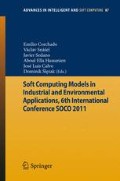Abstract
Thermal efficiency monitoring allows us evaluating the performance of thermal engines which operates under the Rankine cycle. In this research work, massive application of backpropagation neural networks (BPNN) is used with the aim of evaluating the thermal efficiency of processes operating under the Rankine cycle with various working fluids. Knowing the thermal efficiency behavior allows us estimating the best working fluid as well as the optimal operating temperatures for which thermal efficiency is maximized. Achieving mentioned objectives requires a critic modeling task in which massive application of BPNNs are applied. The required information to train the BPNNs is achieved from the NIST database. With such monitoring method, the way to improving the efficiency results a simple reliable task.
Access this chapter
Tax calculation will be finalised at checkout
Purchases are for personal use only
Preview
Unable to display preview. Download preview PDF.
References
Norgard, M., Ravn, O., Poulsen, N., Hansen, L.: Networks for Modelling and Control of Dynamic Systems. Springer, London (2000)
Rutkowski, L.: New Soft Computing Techniques for System Modelling, Pattern Classification and Image Processing. Springer, Berlin (2004)
Witczak, M.: Modelling and Estimation Strategies for Fault Diagnosis of Non-linear Systems. Springer, Berlin (2007)
Huang, G.: Learning capability and storage capacity of two-hidden layer feedforward networks. IEEE. Trans. Neural Networks 14(2), 274–281 (2003)
Setiono, R.: Feedforward neural network construction using cross validation. Neural Comput. 13, 2865–2877 (2001)
Fine, T.L.: Feedforward Neural Network Methodology. Springer, New York (1999)
Tang, H., Tan, K.C., Yi, Z.: Neural Networks: Computational Models and Applications. Springer, Heidelberg (2007)
NIST.: Reference Fluid Thermodynamic and Transport Properties Database (REFPROP) Version 8.0, U.S. Department of Commerce, Maryland (2007)
Fletcher, R., Reeves, C.M.: Function minimisation by conjugate gradients. Computer Journal 7, 149–154 (1964)
Irigoyen, E., Larrea, M., Valera, J., Gómez, V., Artaza, F.: A neuro-genetic control scheme application for industrial R3 workspaces. In: Graña Romay, M., Corchado, E., Garcia Sebastian, M.T. (eds.) HAIS 2010. LNCS, vol. 6076, pp. 343–350. Springer, Heidelberg (2010)
Gómez-Garay, V., Irigoyen, E., Artaza, F.: GENNET-Toolbox: An Evolving Genetic Algorithm for Neural Network Training. In: Romay, M.G., Corchado, E., Teresa Garcia-Sebastian, M. (eds.) HAIS 2010. LNCS, vol. 6076, pp. 368–375. Springer, Heidelberg (2010)
Author information
Authors and Affiliations
Editor information
Editors and Affiliations
Rights and permissions
Copyright information
© 2011 Springer-Verlag Berlin Heidelberg
About this paper
Cite this paper
Garcia, R.F., Rolle, J.L.C., Castelo, J.P. (2011). Thermal Efficiency Supervision by NN Based Functional Approximation Techniques. In: Corchado, E., Snášel, V., Sedano, J., Hassanien, A.E., Calvo, J.L., Ślȩzak, D. (eds) Soft Computing Models in Industrial and Environmental Applications, 6th International Conference SOCO 2011. Advances in Intelligent and Soft Computing, vol 87. Springer, Berlin, Heidelberg. https://doi.org/10.1007/978-3-642-19644-7_43
Download citation
DOI: https://doi.org/10.1007/978-3-642-19644-7_43
Publisher Name: Springer, Berlin, Heidelberg
Print ISBN: 978-3-642-19643-0
Online ISBN: 978-3-642-19644-7
eBook Packages: EngineeringEngineering (R0)

